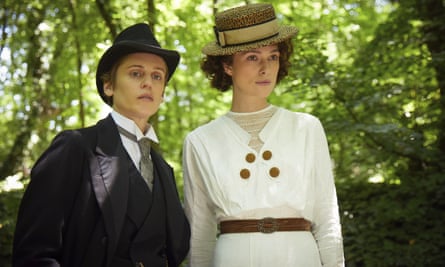The latest TV show to make waves online and ripples around office water coolers, Julia Davis’s Sally4Ever, features an explicit lesbian sex scene in its opening episode. In Killing Eve, Jodie Comer, playing a contract killer, tells Sandra Oh, a UK intelligence officer: “I masturbate about you a lot.”
And there is more more same-sex screen time around the corner. Disobedience, in cinemas at the end of the month, adapts Naomi Alderman’s novel about the affair between two women from a frum (pious) Jewish community, played by Rachel Weisz and Rachel McAdams. Later in the year, Kristen Stewart and Chloe Sevingny co-star in Lizzie, described by one reviewer as “the classiest lesbian axe murderer movie ever”. Keira Knightley plays Colette, in the forthcoming eponymous biopic of the queer writer. Chanya Button directs Vita and Virginia, which tells the story of Vita Sackville-West and Virginia Woolf’s love affair. Olivia Colman, currently filming as Elizabeth II in The Crown, portrays a different, fictional queen in next year’s comedy The Favourite. She has called sex scenes with co-star Emma Stone “awfully fun”.

Why have our screens suddenly become so Sapphic? And, actually, is it sudden? Empire’s editor-in-chief, Terri White, says that in cinema, “what’s most exciting is that we’re starting to see the green shoots of representation outside of just indies, which have always done the majority of the legwork, into, if not blockbusters, then films with a broader base, big-name Hollywood talent and award contenders.”
There has also been a rise in the number of gay women in both the television and film industries: writing, directing, producing, which has the effect of avoiding the male-gaze criticism faced by Abdellatif Kechiche’s direction and writing of 2013’s Blue is the Warmest Colour (but which was widely acclaimed as a breakthrough for lesbian cinema).

Hollywood’s current power-player producer is Megan Ellison (Zero Dark Thirty, Her). Cindy Holland is the hugely influential vice-president of Netflix’s original content. The online channel has just commissioned a show by Charlie Covell, (writer of the The End of the Fucking World), to be executive produced by Nina Lederman. All are gay women. The Bisexual, recently shown on Channel 4, is Desiree Akhavan’s exploration of her own bisexuality. .
Linda Riley, the publisher of the lesbian magazine Diva and a British director of the media monitoring group Glaad, says playing a cameo role in The Bisexual was a great experience because a majority of the cast and crew identified as LGBT. She is clear, however, that there is much more to be done on-screen.
“I am not saying that lesbians have to play lesbian roles, that’s like saying a policeman has to play a policeman, but these roles are rare and there are some incredible lesbian and bisexual actresses out there that it has to be a consideration now.”
Audiences have increasingly responded positively to queer women played by actors both straight and queer, with the straight Lea Seydoux and Adèle Exarchopoulos particularly praised. Aisling Bea, who played a lesbian character in ITV’s The Town, has told me she would be happy to do so again, and Cate Blanchett was nominated for an Academy award for her portrayal of Carol in the eponymous lesbian romance, in 2016.
Screen portrayals of queer women have undoubtedly evolved: in the US, Netflix’s Orange is The New Black was praised for its authentic depiction, as was – initially at least – Amazon’s Transparent, which also features multiple female same-sex relationships.
White points out that many movies no longer just “reflect the pain and struggle of same-sex female - and female-identifying - relationships but the humour, the joy, hell, even the mundanity”.
The industry is learning that audiences are willing to watch diverse stories, whether this be the mega-success of Moonlight, Black Panther and Crazy Rich Asians or catering to the LGBT “pink pound” (apparently worth £6bn in the UK alone), when one in 50 UK people identify as lesbian, gay or bisexual.
Riley, however, would hesitate to believe the cameras have stopped rolling on all stereotypes. “Lizzie, Killing Eve and Sally4Ever all feature lesbian psychopaths or serial killer – a typical lesbian trope.”
She does mention that queer women have at least moved from “cypher characters to lesbian-specific storylines”, citing the love life of Coronation Street’s Sophie Webster. There is also Emmerdale’s Charity and Vanessa hook-up, a storyline which kept viewers guessing about their future together. Soaps have certainly moved on from the the early 90s scandal when Anna Friel shared a passionate lesbian kiss on Brookside. (This is often mistakenly cited as the first lesbian kiss on UK television – that was in the BBC show Girl in 1974).
Friel, who has said she spent years defined by that kiss, “turning down other lesbian roles because it felt like going back to Beth”, is now back in her first lesbian role since then, in The Girlfriend Experience (Amazon Prime).
White says 2018 will be remembered as a significant year for female same-sex relations on screen.
The Favourite will be released on New Year’s Day and Killing Eve, which pulled in audience figures of more than 8 million, has been commissioned for a second series. In the first series, Comer’s character Villanelle tells an ex-girlfriend: “The best sex we ever had was on that chair.” Seems there will be plenty more to come.
